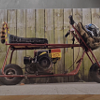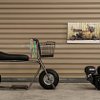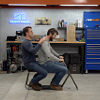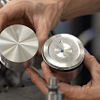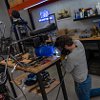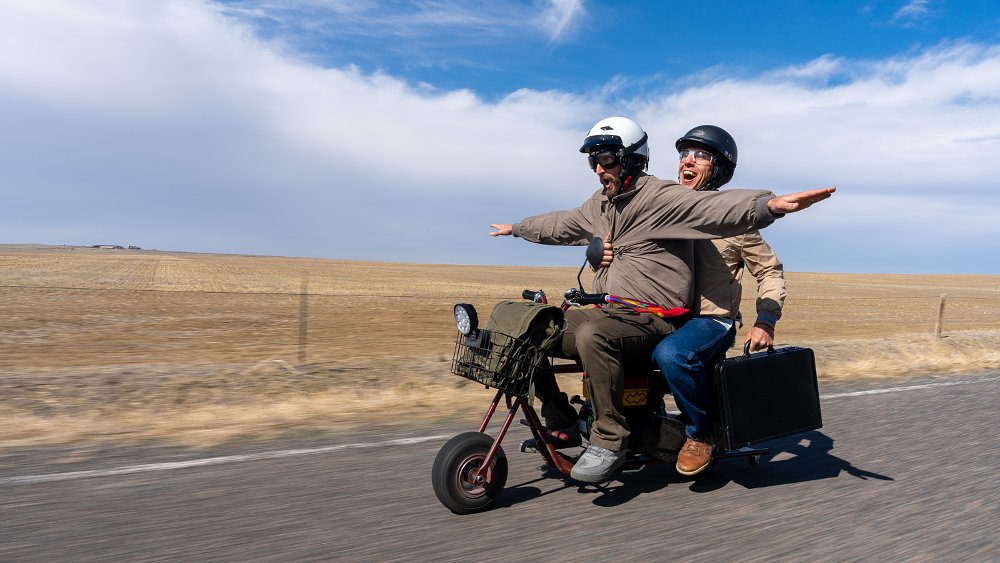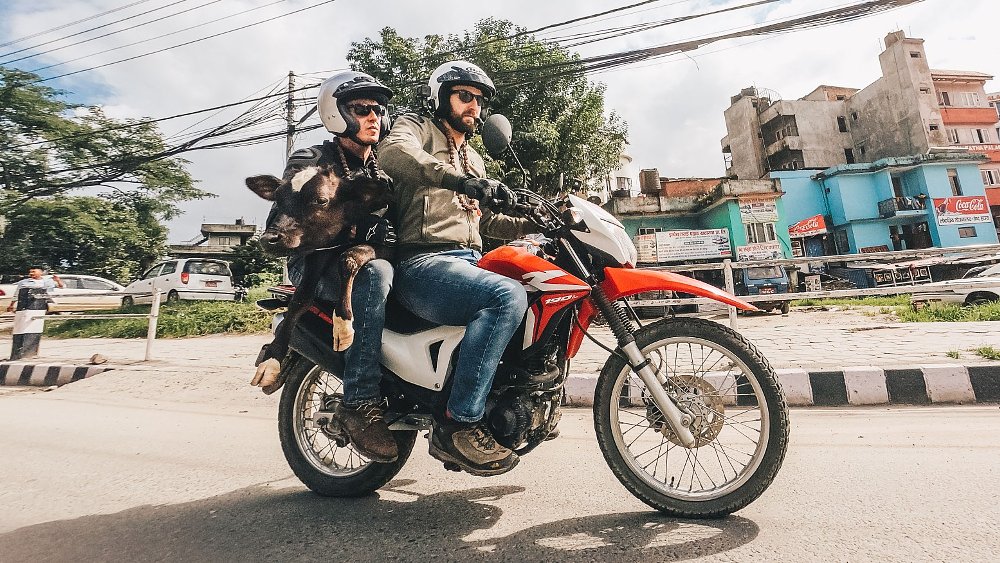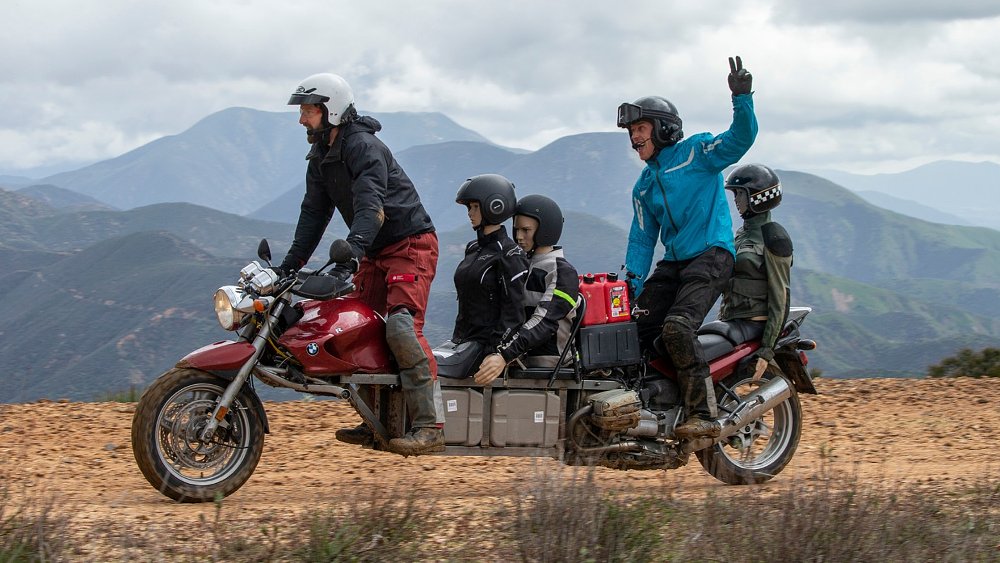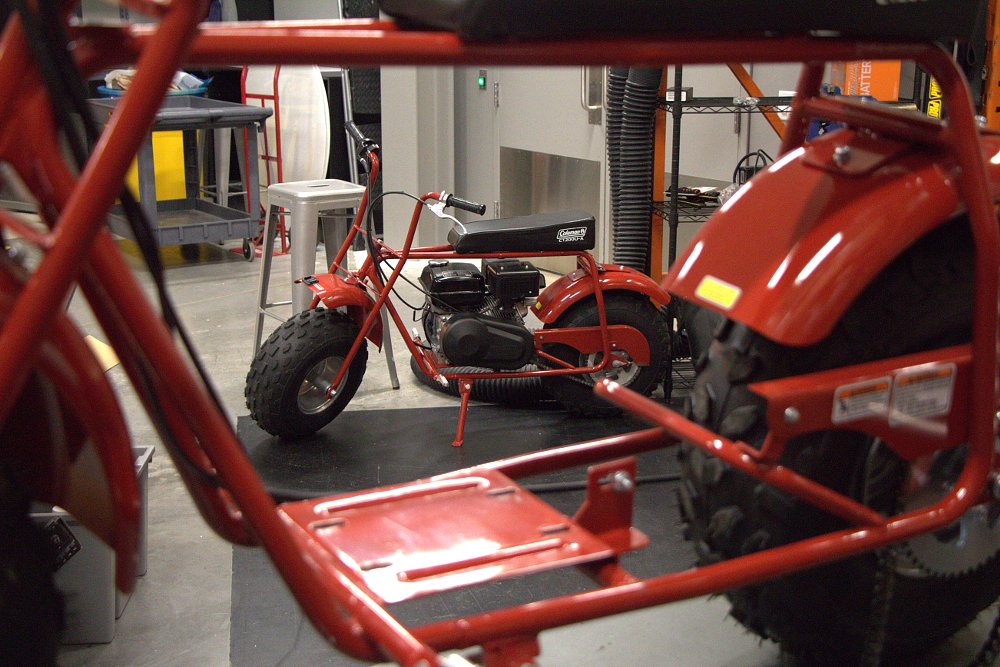It’s got lawnmower-size wheels bolted to a spindly stretched frame, and who could forget that raccoon tail hanging off the hazard-striped sissy bar?
I’m referring, of course, to the misproportioned minibike from the iconic 1994 comedy “Dumb and Dumber”. The contraption pictured above, however, is a replica that Zack and I built as part of an attempt to see if Lloyd (Jim Carrey) and Harry’s (Jeff Daniels) fabled journey from the plains of Nebraska, up to a little place called Aspen, was actually possible.
By now the outcome of that endeavor is well documented in an episode of CTXP. What isn't mentioned in the video is that the whole idea for the adventure sprouted from a half-serious suggestion to ride a pull-start minibike up the eastern flank of the Rockies a la “Dumb and Dumber." That kernel of a concept eventually grew into a committed effort to reenact the scene from the movie, all the way down to the ill-fitting outfits and that ridiculous little machine.

This is the story of how that minibike came to be.
Our initial idea was to flog a Monster Moto or a Coleman rig as sold through Amazon and Walmart. However, the bike would need to be modified to fit two full-grown men, so if we were going to chop it up anyway, why not double down and build a full-blown replica?
Veering away from ready-made bikes and into the realm of DIY kits unearthed a slew of legacy companies that have endured since the minibike boom of the 1960s. One SoCal manufacturer offers a frame kit that is a dead ringer for the one used in the movie, all the way down to the footpegs and grips. But that still left engine and drivetrain setup, and many other components, as big unknowns. We needed guidance, and sadly my calls with retailers were received with disinterest and a discouraging lack of knowledge. Then I got hold of Eric, known on YouTube as the Gray Goat, and knew we’d struck gold.

A bigtime minibike enthusiast and the lead technical advisor at OMB Warehouse, an East Coast minibike and go-kart parts purveyor, Eric understood and appreciated what we were aiming to do. He confirmed our frame choice, identified the appropriate (five-inch!) wheels, and dialed us in with the right parts and advice for modifying our bike’s engine and drivetrain, which we decided would be the popular 6.5-horsepower Predator engine rather than the 3.5-horsepower Tecumseh that powered the movie bike. We were actually going to try to ride this thing up to Aspen, after all. Zack and I then began sniffing out key accessories — a basket, bell, and yes, a raccoon tail, among other things — to complete the build.

In no time we had a pile of parts amassed in the RevZilla West garage. With a poster of the original prop bike taped to the wall as a template, we dove in. Task one was to stretch the frame. Since Zack and I had already perfected our bike-lengthening formula with a five-person BMW R 1150 R, modding the little tube frame was easy. We were careful to make our cuts and welds in the same places as the movie bike, and matched the gussets at the bottom of the frame cradle as well. Propping the seat on the frame we confirmed that it fit this 2021 version of Harry and Lloyd. Barely. It was going to be an intimate ride up to Aspen.

Next we set about dry fitting our oversize engine, which, like the movie bike, we equipped with a Comet CVT to boost our gear range. The engine and CVT were a tight fit within the frame, but a straightforward install, if you’re willing to relocate the fuel tank. We weren’t. The Hog’s red-and-yellow engine-mounted tank is a defining characteristic, so we set about cutting the engine platform and making a bracket to secure a slightly shorter one-gallon Tecumseh tank in its proper place.
From the tank location to the control-cable routing, our desire for accuracy bordered on obsession. And we had a kindred spirit in Lynna Stancato, our Senior Video Production Coordinator, who was joyfully exploring the internet in search of outfits that matched what Lloyd and Harry wore.
With the bones of the bike sorted out, I took the engine to the workbench for upgrading while Zack threw sparks and arcs to fabricate the sissy bar and wheelie bar. A welder with exactly one morning’s experience behind the gun, Zack did a stellar job replicating the globular beads visible on the movie bike.

To (hopefully) ensure we were able to ride the bike rather than push it up the formidable inclines we were bound to encounter in the Rockies, Eric recommended installing a flat-top piston and whacking 0.030-inch off the head to increase compression. We also installed a slotted flywheel key to advance the ignition timing, but left the governor in place. Evidently, raising the rev ceiling is a recipe for connecting rod failure.
Eric had also said that a K&N-style filter and open exhaust would really wake the engine up, but again, Zack and I couldn’t stomach how drastically it would change the bike’s aesthetic. Instead, I set about improving airflow through the head by rounding the square edges of the poorly cast intake and exhaust ports. It’s fun to work on such a crude engine, because it’s so easy to make improvements.
The motor went back together and got shoehorned into the frame, then we bolted the wheels on with ridiculously large hardware and we draped a pathetically skinny #35 chain over the sprockets. With a splash of gas added to the tank, the Hog was seemingly ready for a shakedown ride.
“Shake” seemed to be the key word. A few pulls on the rope and our hopped-up Predator engine came to life and settled into a convulsive idle that had our bicycle bell ringing itself. The front wheel and handlebar were visibly flailing, and within moments the LED light we’d bolted to the basket fatigued its mount and fell. Plate compactors shake less than this thing.

It turns out that wheelie bar was a good idea. Between the short gearing (accentuated by the small rear wheel) and a hard-hitting centrifugal clutch, the Hog catapulted into a wheelie right off the line. The shaking smoothed out at higher rpm, but only slightly. Cornering behavior was bad on the square-profile lawn-tractor tires, and made worse by the fact that the wheelie-bar casters touched down at what felt like 15 degrees of lean. As for slowing down, the brake (there’s only one, a feeble, flexy drum at the rear) was nearly useless. In other words, it was pretty much exactly what we were expecting.

After the test ride we stripped the bike down to the frame for paint and other finishing touches. Rust-Oleum’s Claret Wine (in satin, for those interested in building their own replica) seemed to match the color of the movie bike’s frame best, and we dusted the wheels and drivetrain with primer to create the patina of age. Lightning bolts were carefully drawn on each side of the tank. Yellow electrical tape was wound around the sissy bar, duct tape was sloppily layered onto the seat, and the crown jewel — the raccoon tail — was screwed in place.

We had an accurate and functional mini bike. The final – and perhaps biggest – hurdle was making it street legal. There was no way California, with its Byzantine rules and sadistic DMV officials, was going to register it, so we studied the bylaws of surrounding states, made an appointment at a distant field office, and drove hours to a more lenient jurisdiction where a skeptical police officer reluctantly acknowledged that our “custom construction” did in fact meet all the requirements of the law. And with that, a VIN sticker was affixed to the frame and a temporary plate issued.

The Hog was built, and it was street-legal. You better believe we did a little victory dance to celebrate a successful first step in our movie-recreation dreams.
As for the success of our trip up to Aspen, well, you probably already know how that went. If not, make sure to check out the CTXP episode on the RevZilla YouTube channel.





